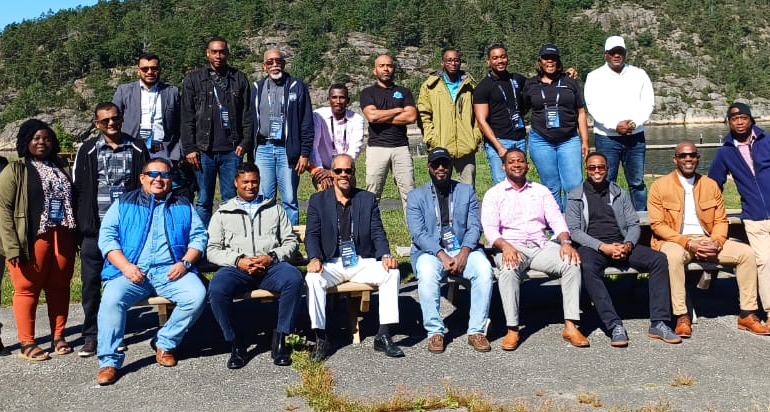
BELIZE CITY, Tuesday, 23 July 2024 (CRFM)—The Caribbean has a strong and impactful presence in the Blue Justice Community–an international alliance which has its genesis in an intersectoral, cross-boundary movement to fight the scourges of illegal, unreported or unregulated (or IUU) fishing and transnational organized crime in the fishing industry. The Blue Justice Community views these nefarious activities as serious and pervasive threats that undermine the rule of law, sustainable development and conservation of the marine living resources, and social and economic stability of the countries participating in the Blue Justice Initiative.

Hon. Saboto Caesar – Minister of Agriculture, Forestry, Fisheries, Rural Transformation, Industry & Labour, Saint Vincent and the Grenadines, addressing gathering at CRFM-Government of Norway side event during the UN Oceans Conference 2022 in Lisbon, Portugal (Photo: Norwegian Ministry of Trade, Industry and Fisheries)
The Caribbean region was recently acknowledged by the Blue Justice Community for setting a stalwart example for other regions to follow, because its chief policymakers have prioritized this matter and taken concerted action. The adoption of the Caribbean Regional Fisheries Mechanism (CRFM) Ministerial Council Resolution No. MC 15 (6) of 2021 regarding the Copenhagen Declaration on Transnational Organized Crime in the Global Fishing Industry and the Blue Justice Initiative was a clear signal of their commitment. En masse, at a high-level meeting in October 2021, several Caribbean Ministers responsible for Fisheries, Aquaculture, and the Blue Economy subsequently signed the International Declaration on Transnational Organized Crime in the Global Fishing Industry. Also known as the Copenhagen Declaration, this international instrument was originally adopted on 15 October 2018 at UN City in Copenhagen, Denmark, and the Blue Justice Initiative was established in 2019 to support countries with implementing the declaration. Twelve CRFM countries signed the Declaration in 2021, and two others signed in 2023. Several of these signatories are now active members of the Blue Justice Community.
Hon. Jullan Defoe, Minister of State in the Ministry of Agriculture, Fisheries, Blue and Green Economy with specific responsibility for Fisheries and Blue Economy, signed the Copenhagen Declaration at the Blue Justice 2023 Conference (Photo: Blue Justice Secretariat)
“The Caribbean region stands as a global leader in tackling organized crime within the fishing industry. It brings me immense pride to witness the significant advancements made in this area. On the governance front, the establishment of the Blue Justice Caribbean Hub marks a crucial milestone, demonstrating a robust commitment to combating illegal activities in fisheries,” said Gunnar Stølsvik, Head of the Blue Justice Secretariat.
Stølsvik added that, “the region has achieved notable operational successes, showcasing the effective implementation of the Copenhagen declaration, which is the political basis of the Blue Justice Initiative. The combined efforts in governance and on-the-ground actions highlight the Caribbean’s exemplary role in fostering a fairer and more sustainable blue economy worldwide.”
The 2024 Blue Justice Community Gathering
CRFM Executive Director, Milton Haughton, spoke at the 5th Blue Justice Anniversary (See related story here.)
Milton Haughton, Executive Director at the Caribbean Regional Fisheries Mechanism (CRFM) Secretariat, and Peter A. Murray, CRFM Advisor – Fisheries Management and Development at the CRFM Secretariat and the CRFM’s technical lead on matters pertaining to IUU fishing and transnational organized crime in the fishing industry, attended the recent Blue Justice Community Gathering (which also doubled as the 5th Anniversary of the Blue Justice Initiative) held on 18-21 June 2024 at Oscarsborg, Norway. Oscarborg, known in the early 1900s as the strongest fortress in all of Northern Europe, has notable historic significance, as it was used as a strategic defense to prevent Nazi Germany’s imprisonment of the King of Norway and his government in 1940.
“Fisheries crimes undermine the significant sacrifice that our countries and our law-abiding fishers make in order to conserve and protect the fish stocks and the marine ecosystem. In these difficult times, characterized by high levels of unemployment, high and rising import bills, growing food and nutrition insecurity, rising crime and social ills, as well as the enormous challenges brought on us by the negative impacts of climate change and ocean acidification, we just cannot continue to allow our fisheries and ocean resources to be plundered and destroyed; our conservation and management measures to be undermined; and the future of our countries and indeed our children, damaged by fisheries crimes,” Haughton said, in addressing the gathering.
These efforts are being strengthend with cutting-edge techologies and tools. The Global Investigative Ship Tracking User Portal (GLISTRUP), launched at the Blue Justice anniversary celebration, is now live and accessible to maritime surveillance and enforcement personnel from States forming the Blue Justice Community. GLISTRUP enables satellite information to be collected by five Norwegian government satellites, and the system offers near real-time data, four years of historical data, and an advanced analysis tool.
The Global Investigative Ship Tracking User Portal is accessible to authorized persons from participating countries.
These include CRFM Member States that are actively engaged in the Blue Justice Community.
The Outcome Document of the Blue Justice Community Gathering was adopted on 21 June 2024, with the hope that the Blue Justice Secretariat will take it into account when preparing for the high-level Blue Justice Conference of the Copenhagen Declaration Countries to be held in 2025. The Copenhagen Declaration had 60 member countries at the time the Outcome Document was adopted.
Representatives from Barbados, Belize, Grenada, Jamaica, Saint Kitts and Nevis, Saint Vincent and the Grenadines, Suriname, The Bahamas, and Trinidad and Tobago attended the gathering.
The Caribbean Community Implementation Agency for Crime and Security (CARICOM IMPACS) and the CRFM were also represented.
(Photo: Peter A. Murray, CRFM Secretariat)
Murray expressed optimism that the Blue Justice Initiative and the Blue Justice Community can strengthen the Caribbean’s fight against illegal, unreported and unregulated fishing and transnational organised crime in the fishing industry.
“The Initiative facilitates cooperation and collaboration among participating countries and international allies that form a part of this global community. This bolsters our collective awareness, knowledge and understanding, empowering us to better confront this complex and daunting problem with more effective and targeted countermeasures,” Murray added.
- Blue Justice Caribbean Hub
He notes that the participants at the gathering applauded the Caribbean region for its efforts to implement the Copenhagen Declaration through the establishment of the Blue Justice Caribbean Hub. They also commended Jamaica for being the host of the Hub’s secretariat and signaled their support for other regions that had expressed interest in establishing similar Hubs.
Hon. Floyd Green, Minister of Agriculture, Fisheries, and Mining, Jamaica, welcomed delegates at the Caribbean launch of the Blue Justice Caribbean Hub in November 2023, in Jamaica (Photo: Milton Haughton, CRFM Secretariat)
According to Murray, “The Blue Justice Caribbean Hub serves as a focal point for the priorities and next steps mapped out at the regional technical meeting convened by the Caribbean Regional Fisheries Mechanism in March 2022. This regional hub supports CRFM and its Member States in our efforts to combat IUU fishing and organised crime in the fisheries sector.”
During a recent engagement on the Hub in Saint Vincent and the Grenadines, Grenada representatives received valuable insights on the extent of such criminal activities in its waters as well as the wider Caribbean. According to Andrea Thomas, Fisheries Officer, Grenada, “the Blue Justice International Tracking Centre (BJITC) revealed an alarming observation: a heavy traffic of objects tracking as fishing vessels with unknown Maritime Mobile Service Identity (MMSI) within Grenadian waters and extending into other Caribbean islands. Grenada, like other Caribbean countries, has porous borders and limited resources, such as manpower and technological assets; so we, too, face significant challenges in preventing foreign vessels from entering our shores undetected.”
Thomas explained that the urgent need to tackle this problem led to the launch of the Grenz Project. This initiative aims to identify, classify, and analyze these vessels in Grenada and the neighboring islands where they also appear, utilizing the Blue Justice framework to address these challenges. By doing so, the project seeks to enhance maritime security and foster regional cooperation in addressing this pressing issue, she added.
- Operationalizing the Caribbean Maritime Security Strategy
The Outcome Document furthermore recognizes the work of the Caribbean Community Implementation Agency for Crime and Security (IMPACS), noting that the Caribbean Maritime Security Strategy (CMSS) and Implementation Plan, approved and adopted by CARICOM Heads of Government in April 2023, supports the Copenhagen Declaration.
Virun Lutchman, Maritime Analyst, Regional Intelligence Fusion Centre, CARICOM Implementation Agency for Crime and Security (IMPACS), said: “Collaboration between CARICOM IMPACS, CRFM and the Blue Justice Initiative remains key to operationalizing the Copenhagen Declaration through the Caribbean Maritime Security Strategy.”
Lutchman noted that, “the recognition by CARICOM Member States of transnational organized crime in the global fishing industry–including not only illegal fishing but also gun trafficking, drug smuggling, human trafficking, and other nefarious crimes taking place along the fisheries value chain–following the adoption of the CRFM Ministerial Council Resolution, marked a high point in the fight against crime in the region.”
“CRFM and CARICOM IMPACS continue to move forward in our effort to reduce opportunities for criminal exploitation in Caribbean fisheries as we bolster food security and regional security in the Caribbean,” Lutchman said.
Strengthening Caribbean Capacity to Fight Back
The formulators of the Outcome Document also acclaimed the launch of the Blue Justice Ocean Surveillance Programme in September 2023. This programme is pivotal to the efforts to adapt to climate change; address fisheries crime; and prevent marine litter from abandoned fishing gear. Through this programme, satellite-based information from a variety of sources will be made available through the Blue Justice Community to eligible authorities.
The need for a Blue Justice Academy was also highlighted. This academy would offer an education programme to strengthen research, knowledge, and skills needed in government agencies and to cooperate in tackling fisheries crime.
Caribbean maritime enforcement and surveillance professionals receive regular training through a partnership between the CRFM and the Regional Security System (RSS). This practical exercise improved tactical and strategic approaches for boat boarding during the regional Fisheries Prosecution and Interdiction Course (FPIC) in 2023
(Photo: Peter A. Murray, CRFM Secretariat)
The Caribbean Regional Fisheries Mechanism also partners with the Regional Security System, another CARICOM agency, to provide training to Caribbean professionals to bolster their fisheries interdiction and prosecution capabilities. The CRFM Ministerial Council has urged the RSS to seek regional accreditation, such as Caribbean Vocational Qualification (CVQ) certification for the training, which they hope would resume in 2025.
The CRFM will also continue to support consultations in CARICOM Member States leading to the finalisation of the National Plans of Action to combat, deter and eliminate IUU Fishing.
“We continue to band together–as a region–with our international partners and allies in fighting this colossal challenge that compounds the threats posed by climate change and natural disasters, such as hurricanes, to the living marine resources and the livelihoods of our people. The rich biodiversity that thrives under the Caribbean Sea provides not just economic opportunities but also food and nutrition security for our region, while maintaining a dynamic cultural heritage that attracts millions of visitors from across the globe to our unparalleled Caribbean destinations,” Milton Haughton, Executive Director of the CRFM Secretariat, said.






